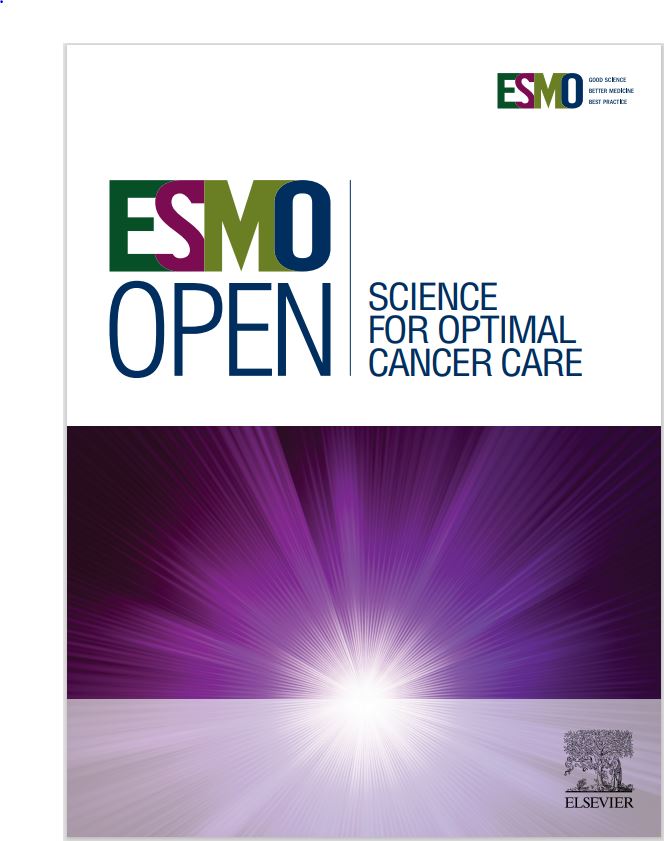Comprehensive genomic and transcriptomic analysis enables molecularly guided therapy options in peritoneal and pleural mesothelioma
IF 7.1
2区 医学
Q1 ONCOLOGY
引用次数: 0
Abstract
Introduction
Peritoneal, pericardial and pleural mesothelioma (PeM/PcM/PM) are rare and aggressive diseases with limited survival. Molecularly guided therapy is currently not part of standard care.
Methods
This study integrates molecular and clinical data from 51 patients (among them 28 PM, one PcM, 21 PeM and one synchronous PeM/PM) enrolled in the National Center for Tumor Diseases and the German Cancer Consortium (NCT/DKTK) Molecularly Aided Stratification for Tumor Eradication Research (MASTER), a multicenter precision oncology registry trial addressing adults with rare advanced-stage cancers. Analysis comprised both somatic and germline whole exome sequencing/whole genome sequencing and transcriptome analysis leading to personalized treatment recommendations issued by a dedicated molecular tumor board. To assess clinical efficacy, progression-free survival (PFS) ratios comparing molecularly informed therapies (PFS2) to preceding systemic therapies (PFS1) were calculated. Efficacy of immune checkpoint inhibition applied during the observation period was assessed accordingly.
Results
Cancer-related genes altered in more than 5 out of 44 assessable patients were BAP1, CDKN2A, NF2, SETD2 and TP53. Somatic (n = 23) or germline (n = 9) alterations in homologous recombination-related genes were detected in 27/44 patients. In 21/44 cases, they were supported by positive combined homologous recombination deficiency scores or BRCAness signature. Following American College of Medical Genetics and Genomics guidelines, (likely) pathogenic germline variants in autosomal dominant cancer predisposition genes were found in 8/51 patients. Molecular tumor board recommendations were issued in 46 cases and applied in 6 cases. Mean PFS ratio was 2.45 (n = 5). Median PFS2 was 6.5 months (n = 6), median PFS1 was 4.0 months (n = 5). A total of 27 patients received immune checkpoint inhibition during the observation period leading to a mean PFS ratio of 1.69 (n = 19).
Conclusions
In mesothelioma, comprehensive molecular analysis can provide valuable clinically actionable information. Molecularly informed therapy recommendations can lead to clinical benefit.
全面的基因组和转录组学分析使分子指导治疗选择腹膜和胸膜间皮瘤
腹膜、心包和胸膜间皮瘤(PeM/PcM/PM)是一种罕见的侵袭性疾病,生存期有限。分子引导疗法目前还不是标准治疗的一部分。方法本研究整合了51例患者的分子和临床数据(其中28例PM, 1例PcM, 21例PeM和1例同步PeM/PM),这些患者加入了国家肿瘤疾病中心和德国癌症联盟(NCT/DKTK)分子辅助分层肿瘤根除研究(MASTER),这是一项针对罕见晚期癌症成人的多中心精确肿瘤学注册试验。分析包括体细胞和种系全外显子组测序/全基因组测序和转录组分析,由专门的分子肿瘤委员会发布个性化治疗建议。为了评估临床疗效,我们计算了分子知情疗法(PFS2)与之前的全身疗法(PFS1)的无进展生存(PFS)比。观察期间应用免疫检查点抑制的效果。结果在44例可评估的患者中,有5例以上的癌症相关基因发生改变,包括BAP1、CDKN2A、NF2、SETD2和TP53。44例患者中有27例检测到体细胞(n = 23)或种系(n = 9)同源重组相关基因的改变。在21/44的病例中,他们被阳性的联合同源重组缺陷评分或BRCAness签名支持。根据美国医学遗传学和基因组学学院的指导方针,在8/51例患者中发现常染色体显性癌症易感基因(可能)致病性种系变异。分子肿瘤委员会建议46例,应用6例。平均PFS比为2.45 (n = 5),中位PFS2为6.5个月(n = 6),中位PFS1为4.0个月(n = 5)。观察期间共有27例患者接受免疫检查点抑制,平均PFS比为1.69 (n = 19)。结论对间皮瘤进行全面的分子分析可提供有价值的临床可操作信息。分子知情的治疗建议可导致临床获益。
本文章由计算机程序翻译,如有差异,请以英文原文为准。
求助全文
约1分钟内获得全文
求助全文
来源期刊

ESMO Open
Medicine-Oncology
CiteScore
11.70
自引率
2.70%
发文量
255
审稿时长
10 weeks
期刊介绍:
ESMO Open is the online-only, open access journal of the European Society for Medical Oncology (ESMO). It is a peer-reviewed publication dedicated to sharing high-quality medical research and educational materials from various fields of oncology. The journal specifically focuses on showcasing innovative clinical and translational cancer research.
ESMO Open aims to publish a wide range of research articles covering all aspects of oncology, including experimental studies, translational research, diagnostic advancements, and therapeutic approaches. The content of the journal includes original research articles, insightful reviews, thought-provoking editorials, and correspondence. Moreover, the journal warmly welcomes the submission of phase I trials and meta-analyses. It also showcases reviews from significant ESMO conferences and meetings, as well as publishes important position statements on behalf of ESMO.
Overall, ESMO Open offers a platform for scientists, clinicians, and researchers in the field of oncology to share their valuable insights and contribute to advancing the understanding and treatment of cancer. The journal serves as a source of up-to-date information and fosters collaboration within the oncology community.
 求助内容:
求助内容: 应助结果提醒方式:
应助结果提醒方式:


